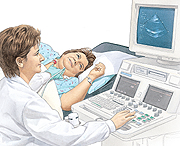Heart Failure: Evaluating Your Heart
To evaluate your condition, your doctor will examine you, ask questions, and run tests. Along with looking for signs of heart failure, the doctor looks for any other health problems that may have led to heart failure. The results of your evaluation will help your doctor form a treatment plan.
Health History and Physical Exam
Your visit will start with a health history. Tell the doctor about any symptoms you've noticed and about all medications you take. Then you'll have a physical exam. This includes listening to your heartbeat and breathing. You'll also be checked for edema (swelling).
Diagnosing Heart Failure

During an echocardiogram, sound waves bounce off the heart. These are converted into a picture on the screen.
The following may be done to help your doctor form a diagnosis:
-
X-rays show the size and shape of your heart. These pictures can also show fluid in your lungs.
-
An electrocardiogram (ECG or EKG) shows the pattern of your heartbeat. Small pads (electrodes) are placed on your chest, arms, and legs. Wires connect the pads to the ECG machine, which records your heart's electrical signals.
-
An echocardiogram uses ultrasound waves to show the structure and movement of your heart muscle. This shows how well the heart pumps. It also shows the thickness of the heart walls, and if the heart is enlarged.
-
Lab tests evaluate small amounts of blood or urine for signs of problems.
Your Treatment Plan
Based on the results of your evaluation and tests, your doctor will develop a treatment plan. This plan is designed to relieve some of your heart failure symptoms and help make you more comfortable. Your treatment plan may include:
-
Medications to help your heart work better and improve your quality of life.
-
Changes in what you eat and drink to help prevent fluid from backing up in your body.
-
Daily monitoring of your weight and heart failure symptoms to see how well your treatment plan is working.
-
Exercise to help you stay healthy.
-
Help with quitting smoking.
Publication Source: National Heart, Lung and Blood Institute
Online Source: National Heart, Lung and Blood Institute
Date Last Reviewed: 2007-09-15T00:00:00-06:00
Date Last Modified: 2009-04-30T00:00:00-06:00
![]() (727) 259-7818
(727) 259-7818